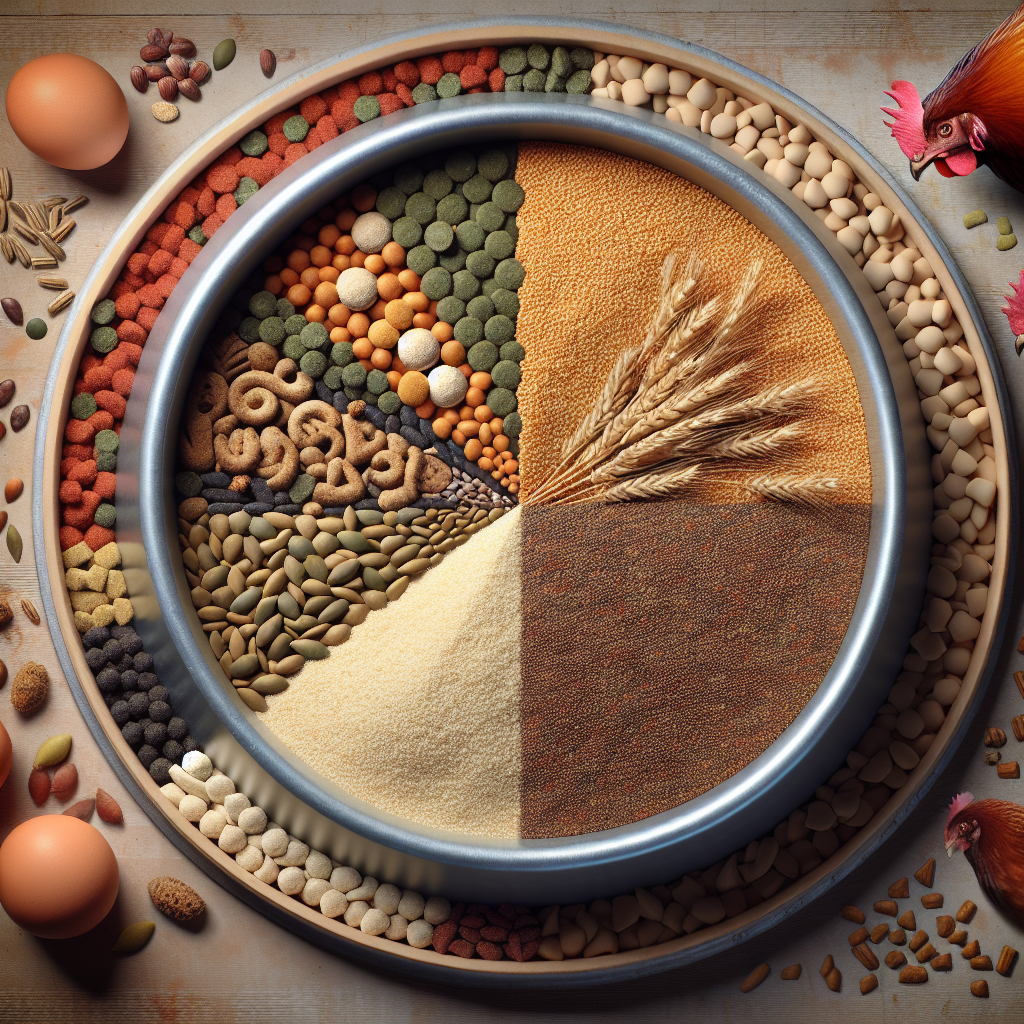If you find yourself pondering about how to ensure a balanced diet to prevent nutritional deficiencies in your beloved flock of chickens, rest assured that you are not alone. As a conscientious chicken owner, it is natural to want to provide your feathered friends with the best possible care to keep them healthy and happy. Thankfully, by following a few simple guidelines and considering their dietary needs, you can ensure that your chickens receive the essential nutrients they need to thrive.
Importance of a Balanced Diet for Chickens
When it comes to raising healthy, thriving chickens, providing a balanced diet is absolutely essential. A balanced diet ensures that your chickens receive all the necessary nutrients they need to support their growth, maintain optimal health, and achieve their production goals. Just like humans, chickens require a variety of nutrients to function properly and to perform at their best.
Understanding Nutritional Needs
In order to provide a balanced diet for your chickens, it is important to understand their nutritional needs. Chickens require a combination of proteins, carbohydrates, fats, vitamins, minerals, and water to meet their daily requirements. Each of these nutrients plays a critical role in the overall health and well-being of your birds.
Consequences of Nutritional Deficiencies
Failure to provide a balanced diet can lead to serious consequences for your chickens. Nutritional deficiencies can result in stunted growth, weakened immune systems, decreased egg production, poor feather quality, and even death. Without the proper nutrients, chickens are susceptible to a variety of health issues and may not reach their full potential.
Determining the Nutritional Requirements
The nutritional requirements of chickens can vary depending on their age, growth stage, purpose (such as meat or egg production), and environmental factors. Understanding these factors will help you determine the specific nutritional needs of your chickens and provide them with a tailored diet plan.
Age and Growth Stage
Chickens have different nutritional requirements at various stages of their lives. Chicks, for example, require a higher percentage of protein to support their rapid growth and development. Adult chickens, on the other hand, may require different nutrient ratios depending on whether they are laying eggs or being raised for meat. It is important to adjust their diet accordingly to ensure they receive the appropriate nutrients for their age and growth stage.
Production Purpose
The purpose for which you are raising chickens will also influence their nutritional requirements. Chickens being raised for egg production will require higher levels of certain nutrients, such as calcium, to support the development of strong eggshells. Chickens raised for meat, on the other hand, may require higher levels of protein and carbohydrates to promote muscle growth and weight gain.
Environmental Factors
Environmental factors, such as temperature and climate, can also affect the nutritional needs of your chickens. Extreme heat or cold can impact their metabolism and nutrient utilization. It is important to consider these factors when formulating a balanced diet plan to ensure your chickens can properly metabolize and utilize the nutrients provided in their feed.
Essential Nutrients for Chickens
To maintain a balanced diet for your chickens, it is crucial to understand the essential nutrients they require. These nutrients include protein, carbohydrates, fats, vitamins, minerals, and water.
Protein
Protein is a vital nutrient for chickens as it is essential for growth, muscle development, and feather production. It is particularly important for young chicks as they are going through rapid growth. Protein can be obtained through various sources such as soybean meal, fish meal, or even insects.
Carbohydrates
Carbohydrates provide energy for chickens and are necessary for maintaining optimal body functions. Grains, such as corn and wheat, are common sources of carbohydrates in chicken feed. These energy-rich nutrients help chickens stay active and maintain their overall health.
Fats
Fats are an important source of energy and also play a role in nutrient absorption, insulation, and the production of essential hormones. Incorporating fats into the diet can be done through the inclusion of vegetable oils or animal fats. However, it is important to provide fats in moderation to avoid overweight chickens.
Vitamins
Vitamins are essential for various bodily functions and overall health. Vitamin A, for example, is important for healthy vision, while vitamin D helps with calcium absorption for strong bones. A variety of fruits, vegetables, and grains should be included in the diet to provide chickens with the necessary vitamins.
Minerals
Minerals, such as calcium and phosphorus, are critical for the development of strong bones and eggshells. Other minerals, like iron and zinc, are required for general health and nutrient utilization. Providing a mineral supplement or incorporating mineral-rich ingredients, such as oyster shell or bone meal, into the diet can help ensure your chickens receive the necessary minerals.
Water
Water is often overlooked when considering a balanced diet, but it is a vital nutrient for chickens. Chickens require clean and fresh water at all times to maintain hydration, aid digestion, regulate body temperature, and ensure overall health. It is important to regularly check water sources and provide enough water to meet the needs of your flock.
Feed Options for a Balanced Diet
There are several options available when it comes to feeding your chickens a balanced diet. These include commercial feeds, natural or homemade feeds, and the use of supplements and treats.
Commercial Feeds
Commercial feeds are a convenient and widely available option for providing a balanced diet for chickens. They are formulated to meet the specific nutritional needs of chickens at different growth stages and production purposes. Commercial feeds come in various forms, including pellets, crumbles, and mash, and often contain a balanced mix of proteins, carbohydrates, fats, vitamins, minerals, and other essential nutrients.
Natural or Homemade Feeds
Some poultry owners prefer to formulate their own chicken feed using natural or homemade ingredients. This allows for greater control over the quality and composition of the feed. Homemade feeds can be made from a variety of ingredients, including grains, seeds, vegetables, fruits, and protein sources such as insects or mealworms. It is important to research and understand the nutritional needs of chickens before creating a homemade feed to ensure all necessary nutrients are included in the diet.
Supplements and Treats
Supplements and treats can be used to enhance the nutritional value of your chickens’ diet. These can include items such as oyster shell for calcium supplementation, probiotics for gut health, or mealworms as a protein-rich treat. While treats can be given in moderation to provide variety and enrichment, it is important to ensure that they do not make up a significant portion of the diet and that the overall nutritional balance is maintained.
Creating a Balanced Diet Plan
Designing a balanced diet plan for your chickens may require some guidance and expertise. Consulting with a poultry nutritionist can provide valuable insight into the specific needs of your flock and help you formulate a diet plan that ensures all necessary nutrients are met.
Consulting with a Poultry Nutritionist
A poultry nutritionist can analyze the specific requirements of your chickens and provide professional advice on formulating a balanced diet plan. They can take into consideration factors such as breed, age, production purpose, environment, and any existing health conditions, to determine the best feeding strategy for your flock. Consulting with a professional can help optimize your chickens’ nutrition and prevent the development of nutritional deficiencies.
Calculating the Feed Composition
Once you have determined the specific nutritional requirements of your chickens, you can calculate the feed composition to ensure a balanced diet. This involves determining the appropriate ratios of proteins, carbohydrates, fats, vitamins, minerals, and water. Commercial feed formulas or input from a poultry nutritionist can help guide you in creating a well-balanced feed composition.
Adjusting for Specific Needs
It is important to regularly evaluate your flock’s nutritional needs and make adjustments to the diet as necessary. Changes in age, growth stage, production purpose, or environmental conditions may require modifications to the feed composition. Monitoring your chickens’ health and performance can provide valuable feedback on the effectiveness of the diet, allowing you to make any necessary adjustments to ensure a balanced diet is provided.
Daily Feeding Practices
In addition to providing a balanced diet, daily feeding practices play a crucial role in maintaining chicken health and preventing nutritional deficiencies.
Providing Adequate Feed Quantity
It is important to provide enough feed to meet the daily nutritional requirements of your chickens. The amount of feed will vary depending on factors such as age, size, growth stage, and production purpose. Be sure to follow feeding guidelines provided by the feed manufacturer or consult with a poultry nutritionist to determine the appropriate amount of feed to provide.
Scheduled and Consistent Feeding
Establishing a consistent feeding schedule is essential for maintaining healthy eating habits in chickens. Regularly scheduled meals help chickens establish routines and ensure they have consistent access to feed. Avoid drastic changes in feeding times or sudden changes in the diet, as this can disrupt the chickens’ digestive system and lead to digestive issues.
Avoiding Overfeeding
While it is important to provide enough feed to meet your chickens’ nutritional needs, it is equally important to avoid overfeeding. Overfeeding can lead to obesity and health issues in chickens, such as fatty liver syndrome or reproductive problems. Monitor your chickens’ body condition and adjust the feed quantity as needed to maintain a healthy weight.
Ensuring Access to Clean Water
Clean and fresh water is a vital component of a balanced diet for chickens. It is essential for hydration, digestion, nutrient absorption, and overall health.
Water Availability
Ensure that your chickens have constant access to clean water. Provide water sources that are easily accessible, especially during hot weather when chickens may require more water to stay hydrated. Check water containers regularly to ensure they are not contaminated or empty.
Water Quality
The quality of water provided to chickens is just as important as its availability. Ensure that the water is clean and free from contaminants such as bacteria, algae, or chemicals. Regularly clean and sanitize water containers to maintain water quality. Water that is unclean or contaminated can lead to various health issues and may discourage chickens from drinking enough water.
Watering Methods
Consider the watering methods used to ensure all chickens have equal access to water. Provide multiple watering stations if necessary, especially if you have a large flock. Automatic waterers or nipple drinkers can help ensure a constant supply of clean water and reduce the risk of contamination.
Monitoring Chicken Health and Performance
Regular monitoring of your chickens’ health and performance is essential in identifying any nutritional deficiencies or health issues in a timely manner.
Regular Physical Observation
Observe your chickens on a daily basis to detect any changes in behavior, appearance, or overall health. Look for signs of lethargy, abnormal feces, abnormal breathing, abnormal feather condition, or changes in appetite. Regular physical observation allows early detection of any potential issues and provides an opportunity to take appropriate action.
Monitoring Feed Consumption
Monitor your chickens’ feed consumption to ensure they are eating a balanced diet. Changes in feed consumption may indicate an issue with taste, palatability, or the effectiveness of the diet. Regularly weigh or measure the amount of feed consumed by your flock to track any changes over time.
Tracking Egg Production and Quality
If you are raising chickens for egg production, monitoring egg production and quality is crucial. Keep track of the total number of eggs laid, any abnormal coloration or texture of the eggs, and any reduction in egg production. Changes in egg production or quality can be an early indicator of nutritional deficiencies or health issues.
Potential Nutritional Deficiency Signs
Recognizing the signs of potential nutritional deficiencies in your chickens allows for prompt intervention and correction of imbalances.
Feather Issues
Abnormal feather condition, such as feather loss, excessive molting, or dull and brittle feathers, can be indicative of nutritional imbalances. Feathers require certain proteins, amino acids, and vitamins for healthy growth and maintenance. Regularly inspect your chickens’ feathers and seek professional guidance if any issues are noted.
Reduced Egg Production
A decrease in egg production or poor egg quality can be linked to nutritional deficiencies. Insufficient levels of calcium, vitamins, or other essential nutrients can impact the laying capabilities of hens. Monitor egg production and quality closely and take appropriate steps to address any decline.
Poor Growth or Weight Gain
Failure to achieve appropriate growth or weight gain can be a sign of nutritional deficiencies in chickens. Lack of adequate protein, carbohydrates, or vitamins can impact the development and overall health of your flock. Regularly check the growth and weight of your chickens to ensure they are progressing as expected.
Seeking Veterinary Advice
If you suspect or observe any signs of nutritional deficiencies in your chickens, it is important to seek professional veterinary advice for a proper diagnosis and customized nutritional recommendations.
Diagnostic Testing
A veterinarian can conduct diagnostic testing and analyze the specific nutritional needs of your flock. Blood tests and other diagnostic tools can help identify any deficiencies or imbalances. Based on the results, customized nutritional recommendations can be provided to address any issues and promote optimal health.
Customized Nutritional Recommendations
A veterinarian or poultry nutritionist can provide you with customized nutritional recommendations based on the specific needs of your chickens. These recommendations may include adjustments to the diet composition, supplementation of certain nutrients, or changes in feeding practices. Following these recommendations will help ensure a balanced diet for your chickens and prevent the development of nutritional deficiencies.
By understanding the importance of a balanced diet, determining the nutritional requirements, providing essential nutrients, choosing the right feed options, creating a balanced diet plan, practicing daily feeding habits, ensuring access to clean water, monitoring health and performance, recognizing signs of deficiency, and seeking veterinary advice when needed, you can ensure that your chickens receive a well-rounded and nutrient-rich diet. This will not only support their overall health and well-being but also maximize their productivity and performance as they thrive in your care.




